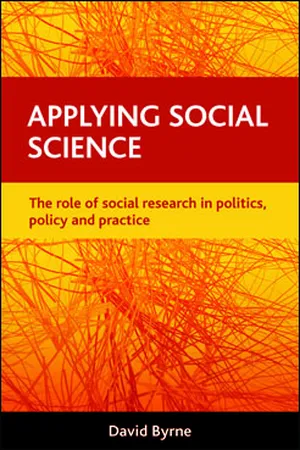![]()
Bibliography
Abbott, A. (1988) ‘Transcending general linear reality’, Sociological Theory, vol 6, pp 169–86.
Abbott, A. (1998) ‘The causal devolution’, Sociological Methods and Research, vol 27, no 2, pp 148–81.
AcSS Commission (2002) Great expectations, London: Academy of Social Sciences.
Alam, S.H., Meyer, R., Ziervogel, G. and Moss, S. (2007) ‘The impact of HIV/AIDS in the context of socioeconomic stressors: an evidence-driven approach’, Journal of Artificial Societies and Social Simulation, vol 10, no 4, p7.
Alberti, G. (2007) Emergency access: Clinical case for change, London: Department of Health.
Allen, C. (2008) Housing market renewal and social class, London: Routledge.
Archer, M.S. (1995) Realist social theory: The morphogenetic approach, Cambridge: Cambridge University Press.
Arnstein, S.R. (1969) ‘A ladder of citizen participation’, Journal of the American Institute of Planners, vol 35, no 4, pp 216–24.
Audit Commission (2007) The academies programme, HC: 254 2006–2007, London: HMSO.
Bahro, R. (1978) The alternative in Eastern Europe, London: NLB.
Bains Report (1972) The local authorities: Management and structure, London: HMSO.
Balloch, S. and Taylor, M. (2001) Partnership working: Policy and practice, Bristol: The Policy Press.
Bang, H. (2002) ‘Culture governance: a new mechanism for connecting system and lifeworld’, Paper presented at the ECPR joint sessions of workshops, Workshop 6, Turin, Italy, 22–27 March.
Barker, K. (2007) ‘The UK Research Assessment Exercise: the evolution of a national research evaluation system’, Research Evaluation, vol 16, no 1, pp 3–12.
Barnes, D., Wistow, R., Dean, R. and Foster, B. (2006) National child and adolescent mental health service mapping exercise 2005, Durham: School of Applied Social Sciences, Durham University.
Barnes, M., Matka, E. and Sullivan, H. (2003) ‘Evidence, understanding and complexity: evaluation in non-linear systems’, Evaluation, vol 9, no 3, pp 265–84.
Bartholomew Working Party on the Measurement of Unemployment in the UK (1995) ‘The measurement of unemployment in the UK (with discussion)’, Journal of the Royal Statistical Society Series A, vol 158, part 3, pp 363–418.
Bateson, N. (1984) Data construction in social surveys, London: Allen and Unwin.
Beatty, C., Fothergill, S., Gore, T. and Powell, R. (2007) The real level of unemployment 2007, Sheffield: CRESR.
Beveridge, W. (1909) Unemployment: A problem of industry, London: Longmans, Green and Co.
Bhaskar, R. (1979) A realist theory of science, Brighton: Harvester.
Bierce, A. (1911) The devil’s dictionary (www.thedevilsdictionary.com).
Blackman, T. (2006) Placing health, Bristol: The Policy Press.
Blackman, T., Wistow, J. and Byrne, D.S. (2010, forthcoming) Variations between Spearhead areas in progress with tackling health inequalities in England, SDO Project Ref: 08/1716/203.
Blaikie, N. (2007) Approaches to social enquiry, Cambridge: Polity.
Blamey, A. and Mackenzie, M. (2007) ‘Theories of change and realistic evaluation’, Evaluation vol 13, no 4, pp 439–55.
Blanden, J., Gregg, P. and Machin, S. (2005) Intergenerational mobility in Europe and North America, Bristol: Centre for Economic Performance.
Blowers, A. (2002) ‘Political modernization and the environmental question’, Local Government Studies, vol 28 no 2, pp 69–87.
Borgerson, K. (2009) ‘Valuing evidence: bias and the evidence hierarchy of evidence-based medicine’, Perspectives in Biology and Medicine, vol 52, no 2, pp 218–33.
Bosse, T. and Gerritsen, C. (2010) ‘Social simulation and analysis of the dynamics of criminal hot spots’, Journal of Artificial Societies and Social Simulation, vol 13, no 2, pp 5 (http://jasss.soc.surrey.ac.uk/13/2/5.html).
Boyle, R. (2006) Mending hearts and brains: Clinical case for change, London: Department of Health.
Bradley, W.J. and Schaefer, K.C. (1998) The uses and misuses of data and models, London: Sage.
Brady, D. (2004) ‘Why public sociology may fail’, Social Forces, vol 82, no 4, pp 1629–38.
British Academy (2008) Punching our weight: The humanities and social sciences in public policy making, London: British Academy.
Burawoy, M. (2004) ‘Public sociologies: contradictions, dilemmas and possibilities’, Social Forces, vol 82, no 4, pp 1603–18.
Burns, D. (2006) ‘Evaluation in complex governance arenas: the potential of large system action research’ , in B. Williams and I. Imam (eds), Using systems concepts in evaluation, Fairhaven, MA: American Evaluation Association.
Burns, D. (2007) Systematic action research, Bristol: The Policy Press.
Byrne, D.S. (1998) Complexity theory and the social sciences, London: Routledge.
Byrne, D.S. (2000) ‘Newcastle’s going for growth: governance and planning in a postindustrial metropolis’, Northern Economic Review, vol 30, pp 3–16.
Byrne, D.S. (2002) Interpreting quantitative data, London: Sage.
Byrne, D.S. (2005a) ‘Complexity, configuration and cases’, Theory, Culture and Society, vol 22, no 5, pp 95–111.
Byrne, D.S. (2005b) ‘Theory, role of’, Encyclopedia of social measurement, Los Angeles: Elsevier Inc, pp 785–9.
Byrne, D.S. (2009a) ‘Complex realist and configurational approaches to cases: a radical synthesis’, in D.S. Byrne and C. Ragin (eds) Sage handbook of case based methods, London: Sage, pp 101–12.
Byrne, D.S. (2009b) ‘Using Cluster Analysis, Qualitative Comparative Analysis, and NVIVO in relation to the establishment of causal configurations with pre-existing large N data sets: machining hermeneutics’, in D.S. Byrne and C. Ragin (eds) Sage handbook of case based methods, London: Sage, pp 260–8.
Byrne, D.S. (2010) ‘Idleness’ in G. Calder, J. Gass and K. Merrill-Glover (eds) The British welfare state at 60, Cardiff: University of Wales Press.
Byrne, D.S. and Doyle, A. (2005) ‘The visual and the verbal – the interaction of images and discussion in exploring cultural change’, in C. Knowles and P. Sweetman (eds) Using visual methods, London: Routledge.
Byrne, D.S. and Ruane, S. (2007) ‘The case for hospital reconfiguration – not proven: A response to the IPPRs The Future Hospital’, www.nhscampaign.org.uk/uploads///documents/Reconfiguration%20Not%20Proven.pdf
Byrne, D.S., Williamson, W. and Fletcher, B. (1975) The poverty of education, London: Martin Robertson.
Byrne, D.S., Olsen, W. and Duggan, S. (2009) ‘Causality and interpretation in Qualitative policy-related research’, in D.S. Byrne and ...
